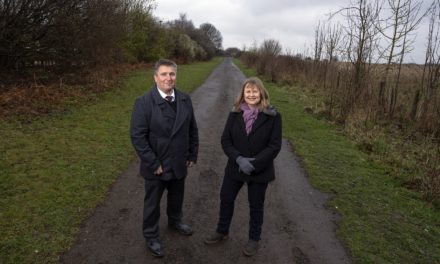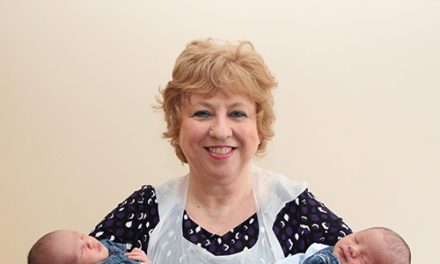By County Councillor John Clare
Last week I attended a conference on the rollout of Universal Credit (UC) in County Durham, which is coming to Newton Aycliffe in March 2018. To be honest what I found out was terrifying, and I came away thinking that we have six months to try to get ourselves ready for what is going to be a significant shock to the community, and particularly to the individuals involved.
Please note in what follows that I am NOT an expert, and am just reporting to you what I was told at the conference. However, if even half of what follows is true, it is clear that we need to warn people about what is going to happen. It is clear that people going onto UC would be wise to prepare in advance, and will need specialist advice.
WHAT IS UNIVERSAL CREDIT?
Universal Credit replaces a range of ‘legacy’ welfare benefits – such as housing benefit and income support – with a single monthly payment. There is a DCC factsheet about it here: bit.ly/UCDCCFS
The idea of Universal Credit is that it treats claimants how they would be treated if they were in a job with a monthly wage payment, and that it thus helps claimants to develop budgeting practices which will fit them for the world of work when they get a job. It also has a (much criticised) ‘taper’ which is supposed to help people moving in and out of work.
THE PROBLEMS OF UNIVERSAL CREDIT
However, as the conference made clear, introducing UC is accompanied with many problems, over many of which the claimant has no control, and all the evidence is that many people going onto UC are plunged into financial crisis and debt. Issues raised at the conference included:
(1) UP TO £2,300 A YEAR WORSE OFF
Many families will find themselves absolutely worse off under UC – the Institute for Fiscal Studies suggests that some families may gain, but that 1.1 million homes with no-one in paid work will lose out by up to £2,300 a year. Working single parents are said to face an annual loss of £1,000.
People moving from ESA to UC have experienced particular problems in transferring their allowance across; many people are (disastrously) losing their Severe Disability Premium.
Self-employed people with variable earnings, and people who have a variable payday, also keep finding themselves in difficulties, because their reported income one month affects how much they are given to live on next month.
People who have childcare costs are often experiencing similar difficulties, because they are paid in arrears, with an “horrendously” complex reporting system, and frequent problems uploading their receipts online.
(2) ONLINE CLAIM PROCESS
UC is designed to be claimed online. This is difficult for people who do not have access to a computer-with-internet or a smart phone. Nor is it enough to use a friend’s equipment to apply, because claimants are expected continually to update their position online, and have a ‘claimant commitment’ to check online every day (e.g. for job offers). Practitioners at the conference reported that older claimants frequently had no way to get online and that, whilst younger claimants often had a phone, they were having to make multiple phone calls and data usage when they were regularly “out of credit”.
The online application can take half-an-hour to two hours, even with an adviser helping.
The reading age of the application form is low (RA12), but this is still no use for the large numbers of people unable to read or write.
There are also problems with photo-id, which you are supposed to be able to upload online, but which doesn’t work. This can lead to severe delays because, atm, if the claim is not accompanied with ID, it is closed without notice, and claimants sit waiting for a claim which has in fact been abandoned. (The advice was that, at the point of claim, applicants should phone and book an ID appointment). A range of ID is allowed, including a driving licence or a current passport, but who on benefits can afford either?
It is worthwhile noting that claimants need a Bank Account – which itself raises ID difficulties. Although the process officially accepts a Postal Account, this can only be arranged by the DWP and is not available for claimants doing the online application process.
(3) WAITING PERIOD AND DELAYS
After making a claim – and assuming it is error-free – there is a seven-day waiting period before the start of the Application Process, which then takes a month. There is then a 5-day wait until the first payment is made (i.e. six weeks with no income). The DWP work on the principle that a person who has fallen out of work will have built up a buffer to ‘tide them through’; the fact is that most people coming onto UC are already in substantial debt, which the move to UC exacerbates.
All this is compounded by the fact that only 58% of applications in Hartlepool end up with a payment on the theoretical payment date. Half of the delays to the other applications are caused by DWP error, not the claimants’. An adviser from Hartlepool Housing Group Thirteen found that, of 200 cases which had needed her intervention, a third involved vulnerable or disabled people, many of them with high levels of existing debt already.
Again, much of this is no fault of the claimant. Delays, said the adviser from Hartlepool, do *not* ‘iron themselves’ out – claimants experiencing problems need to contact an adviser and get the matter addressed – and practitioners at the conference agreed that problems are taking much longer to sort out under UC. One problem advisers are finding is that there is no ‘escalation’ phone number, and also that whereas before they could ring up the DWP and discuss a client over the phone under ‘implicit consent’, now they had to seek permission in writing, creating endless delays.
(4) RENT PAYMENTS
The situation is worse with housing payments. The idea of UC is that the claimants are given their rent money and are responsible for paying it (as they would if they got a wage); this of course is disastrous for a whole range of people, not least addicts. So it IS possible – if you are 2 months in arrears or vulnerable – to apply for an Alternative Payment Arrangement whereby your rent is paid directly to the landlord. This application is often subject to huge delays, so practitioners at the conference advised that it is done at the point of application for UC. Even then, however, DWP do not pay the landlord at the same time as they pay the claimant, but on some weird schedule. The adviser from Thirteen showed how this could cause rent arrears to balloon to £1,500 **through no fault whatsoever of the client**. Even the most careful tenants, with applications which go through perfectly, she said, will find themselves unavoidably one week in arrears. She described the toll of this on vulnerable tenants in terms of stress and mental health.
(5) MONTHLY PAYMENTS AND DEDUCTIONS
For many people, moving from fortnightly to monthly budgeting is a significant shock. Everybody agreed that this resulted in large numbers of people having to go to foodbanks; for many this is an unbearable shame. The move to UC is has been accompanied by a 10% increase in priority debt (and, presumably, in other debts including doorstep lenders).
People claiming in-work on thirteen four-weekly payments often get taken by surprise because their UC is paid monthly … which means that once a year they appear not to get a UC payment.
Again, practitioners advised that people applying for UC then also apply as soon as possible for advance payments and hardship payments (although note that these have to be paid back).
For people who find it impossible to budget, or are in debt, it is possible to arrange to put things like Council Tax, repayment of advance allowance, old debts etc. onto APA (again, it is best to ask at the point of application). However, these deductions can take up to 40% of UC, taking a claimant’s disposable income down to £190 a month – £44 a week.
(6) CLAIMANT COMMITMENT
Practitioners reported a large number of problems for people claiming UC (instead of Tax Credits) who were in-work – where they had a month with many hours’ work they were finding themselves sanctioned for not spending enough hours job-seeking. Conference delegates reported similar problems with claimants volunteering to gain work experience. Again, the advice was to sort these issues out with Job Centre Plus at the point of application, because they were difficult to change later.
Sanctions can be fierce. Missing an email or a message can lead to a claimant being sanctioned.
(7) THE ON-LINE JOURNAL
There is good and bad about the ‘Journal’ claimants are required to keep. It is a very effective way of communication between claimant and JC+, and – where it has been properly completed – practitioners are finding it invaluable in proving claimants’ claims against the DWP.
However, where a claimant has limited IT skills or access, it causes immense problems. They may have been able to go round to a friend’s house to make their application, but they cannot go round every day to update their journal. And – whilst many people have a smart phone – you will have seen from facebook that some lack the literacy skills to complete the Journal meaningfully.
Blind people are having immense difficulties.
It may be that DCC Adult Literacy has a role to play with literacy and skills – there are many free basic learning course available here: bit.ly/DCCALC17, and claimants may well benefit if they take steps to improve their literacy and numeracy before it is too late.
(8) THE VITAL IMPORTANCE OF GOOD ADVICE
One thing that came out of the conference is that the system is horrifically complex, and not the province for a generalist adviser. The rules for the new ‘full service’ UC are different to the original ‘live service’ UC, so advisers are now juggling with (including legacy benefits) THREE different benefit systems. The advice was that that potential claimants need to seek specialist advice – advisers can lose a claimant £1,000 if they advise them to apply too early (e.g. if they have a delayed payment from their previous employment), and specialist advisers are especially important for those entitled to contribution-based benefits, those appealing a fit-for-work decision, those with a temporary change of circumstances, people in receipt of the Severe Disability Premium, people on ESA who don’t require a means-tested top-up, and clients who are in WRAG or support group or ESA.
FURTHER HELP
If you will be moving to UC in March and are worried or want to start preparing in advance, either phone Citizens Advice on 03444 111444 or the Council’s benefits line 03000 262000.









